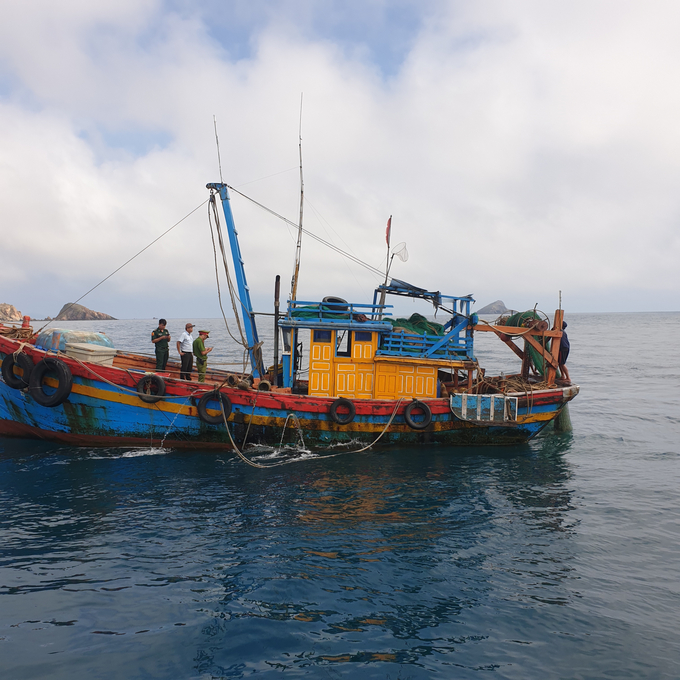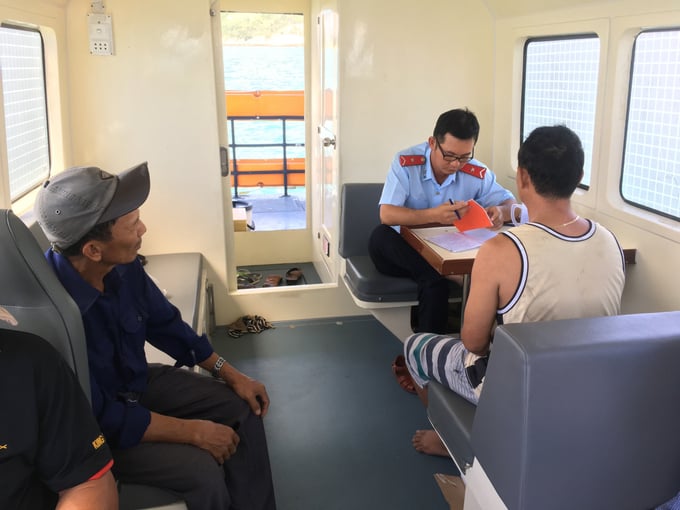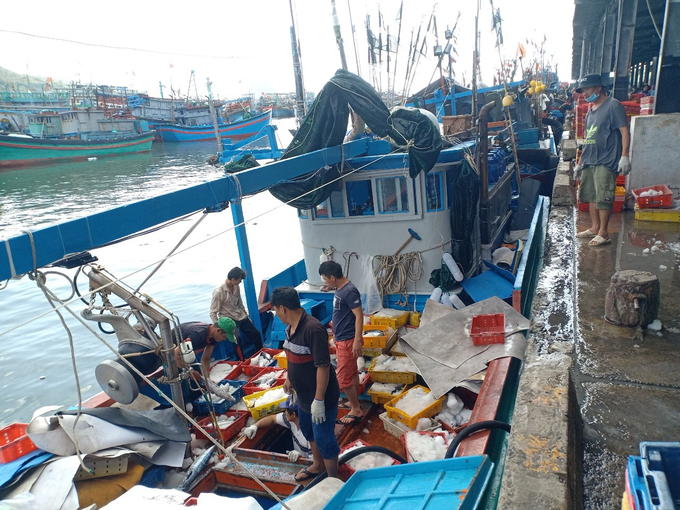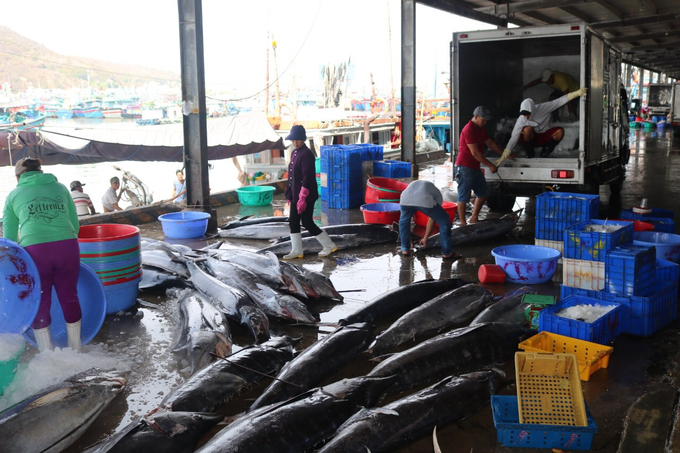June 1, 2025 | 04:07 GMT +7
June 1, 2025 | 04:07 GMT +7
Hotline: 0913.378.918
June 1, 2025 | 04:07 GMT +7
Hotline: 0913.378.918
Binh Dinh has been evaluated as a province with many efforts in preventing IUU fishing violations, but so far this province has had many cases of fishing vessels violating foreign waters and being arrested. The fishing vessel monitoring system (VMS) and monitoring equipment has not operated stably and smoothly. Many fishing vessels disconnect from the monitoring system and cross the warning boundary. Investigation and handling of violations in foreign waters have not been timely and ensured the deterrence and strictness of the law.

Binh Dinh's functional department inspects fishing activities at sea. Photo: V.D.T.
According to Binh Dinh Department of Agriculture and Rural Development, in 2021, only from February to May, this province had 16 ships with 97 crew members caught in violation of IUU fishing by foreign countries. Phu Cat district has 14 ships/85 crew members, Phu My district has 2 ships/12 crew members. In the first 9 months of 2022, Binh Dinh continued to have 7 violating ships.
“Binh Dinh still has many cases where the decision to sanction fishing vessel’s foreign waters infringement has not yet been implemented because most of the violating ship owners have been arrested by foreign countries and lost their fishing equipment. The fishermen are living in difficult conditions, and their domestic assets are not enough to pay the fine, so it is not possible to exercise coercion as per regulations.
“As for fishing vessel owners who deliberately refuse to pay fines, the local authorities are conducting verification of economic sources and assets to serve the coercion execution on sanctioning administrative violations," said Mr. Tran Van Phuc, Director of Binh Dinh Department of Agriculture and Rural Development.

Binh Dinh's functional department makes a record of violations of the violating fishing vessel right at sea. Photo: V.D.T.
In Quang Nam, IUU fishing prevention work also has many problems. Mr. Nguyen Dinh Toan, Deputy Director of Quang Nam Sub-Department of Fisheries, said, “Regarding the implementation of regulations on recording and submitting fishing diary, although the Department of Agriculture and Rural Development has regularly propagated and disseminated regulations, instructing fishermen and captains on how to record forms of fishing diary, a part of fishermen still has limited awareness of the procedures. Many ship captains still do poorly on the recording of fishing diary.”
Apart from the mentioned issues, many fishing vessel owners have intentionally violated regulations due to pressure on profits, revenue and output. Their fishing vessels are licensed on the high seas, but they exploit the coastal areas or may even go to the waters under the sovereignty of other countries in the region.

Khanh Hoa fishing boat docked to sell products. Photo: K.S.
According to Mr. Nguyen Van Muoi, Director of Quang Ngai Sub-Department of Fisheries, the situation of fishermen and fishing vessels violating foreign waters had been controlled and prevented, the problem was not completely eliminated.
The rate of fishing vessels registered, issued with fishing licenses and installed VMS equipment in Quang Ngai is still low. Cases of fishing vessels crossing the boundary or losing connection detected through the monitoring system are many, but the handling of violations still shows little effectiveness.
According to Mr. Tran Phuoc Hien, Vice Chairman of Quang Ngai People's Committee, the province has repeatedly proposed to the Ministry of Agriculture and Rural Development on the need for a central focal point to avoid cases where ship owners see one locality enforcing the law drastically and making life difficult for them and decide to move to another locality or move from one port to another. Quang Ngai proposed the Department of Fisheries act as the focal point for general supervision and management.

Khanh Hoa is facing many difficulties in preventing IUU illegal fishing, especially in terms of infrastructure for fishing ports and storm shelters. Photo: K.S.
In a similar manner, Khanh Hoa is also facing many difficulties in the fight against IUU fishing, especially in terms of infrastructure. Fishing ports and storm shelters in service of the province's fisheries development have not been invested and upgraded commensurate with practical needs.
Agencies are unable to perform their tasks well due to limited human and financial resources. The fishery control force has not been established in localities to best meet the mission requirements. The Fisheries Stations under the localities’ Sub-Departments of Fisheries are the ones performing the state management in the field of fisheries. Heads of Fisheries Stations and heads of Representative Offices in localities such as Da Bac, Vinh Luong, and Dai Lanh have no choice but to work concurrently. As a result, the task performance remains full of hurdles.
(To be continued)
Translated by Samuel Pham

(VAN) Several scientists and farmers are experimenting with soil treatment in some key durian-growing regions such as Cai Lay (Tien Giang), Dak Song, Gia Nghia, and Dak R’lap (Dak Nong).
/2025/05/25/4127-3-073637_820.jpg)
(VAN) Thanks to the promotion from an FAO-implemented project, vegetable production in greenhouses in Moc Chau has seen strong development, from 1.5 hectares in 2021 to nearly 50 hectares in 2024.

(VAN) FAO has recently supported USD 140,000 to implement the project 'Risk mitigation human-animal interface risks through disease control initiatives in pig farming.'

(VAN) The People's Committee of Tra Vinh province has approved an adjustment to the investment policy for the Green Hydrogen Plant project, increasing its area to approximately 52.76 hectares.
![Reducing emissions from rice fields: [2] Farmers’ commitment to the soil](https://t.ex-cdn.com/nongnghiepmoitruong.vn/608w/files/news/2025/05/05/dsc08881jpg-nongnghiep-140632.jpg)
(VAN) Clean rice cultivation model in Thuong Tan commune, Bac Tan Uyen district, is assisting local residents in achieving sustainable agriculture by substantially reducing costs, increasing productivity, and protecting the environment.

(VAN) At the conference to disseminate Resolution No. 68, AgriS introduced its digital agricultural ecosystem and reaffirmed its commitment to accompanying the Government in promoting private sector development and sustainable agriculture.

(VAN) 'Blue Ocean - Blue Foods' initiative is designed to restore marine ecosystems and establish sustainable livelihoods for local communities by cultivating a minimum of 1,000 hectares of cottonii seaweed in the first three years.